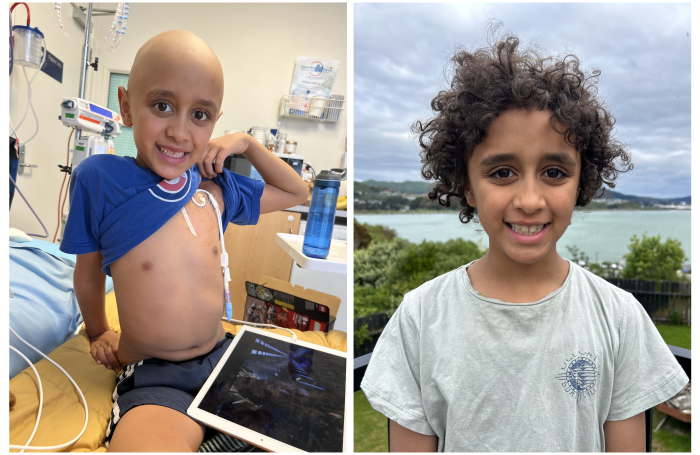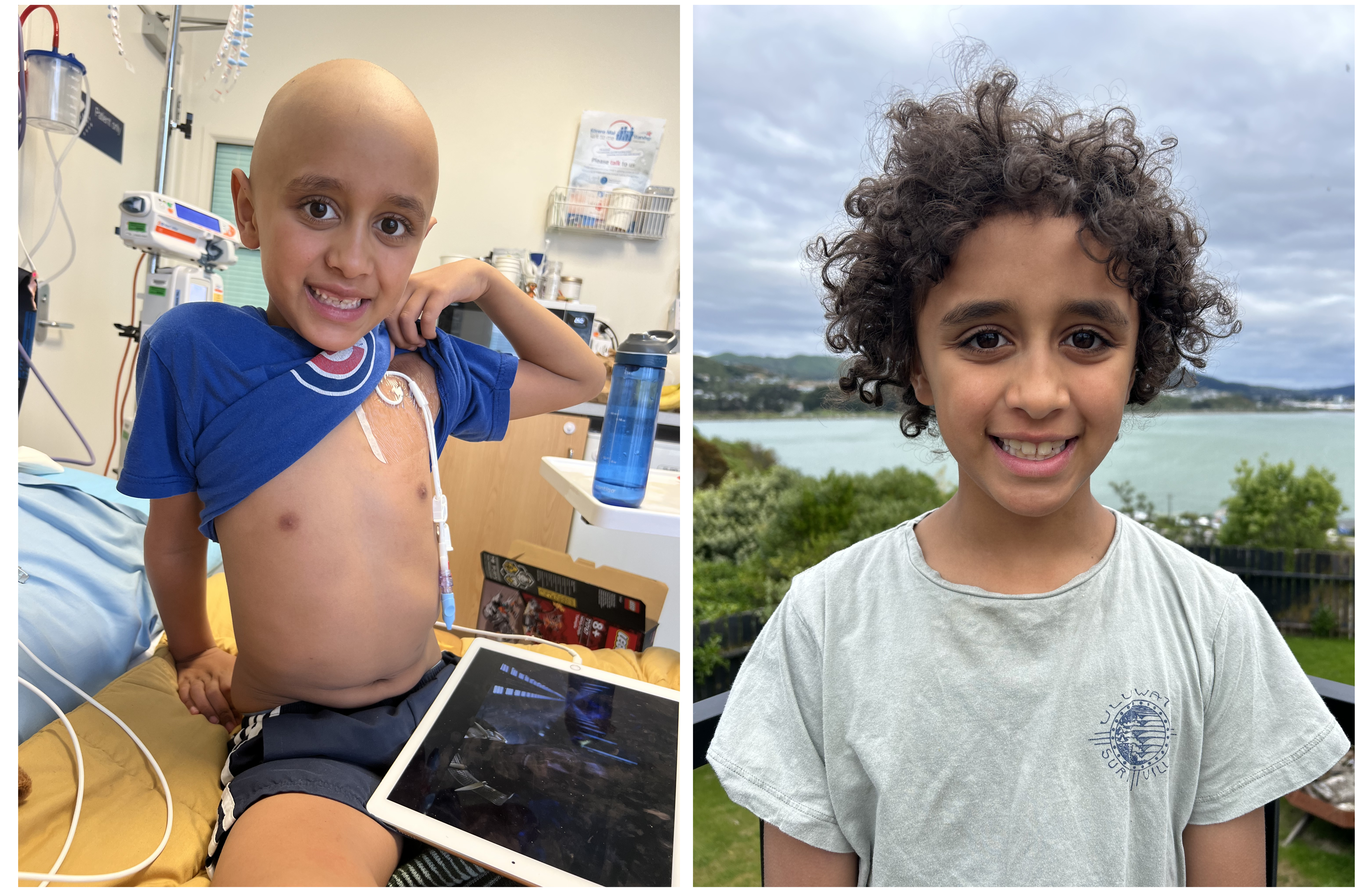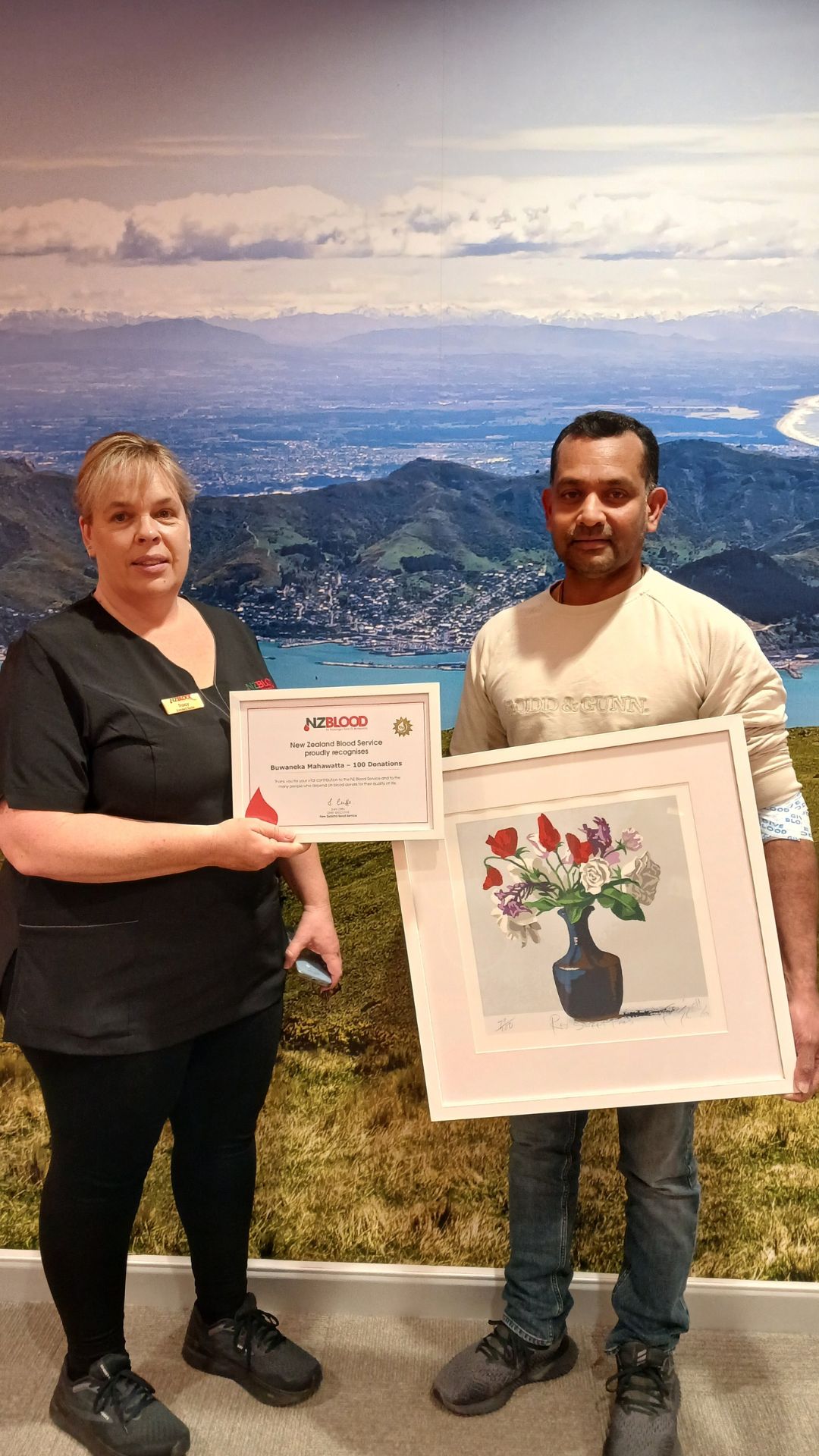Amazing Story
New Zealand Blood Service: more than blood

When people hear ‘New Zealand Blood Service’, their thoughts naturally turn to blood collection and blood donation, and perhaps that all-important ‘liquid gold’, plasma. But we are also home to the National Heart Valve Bank, the New Zealand Bone Marrow Donor Registry, and Organ Donation New Zealand. Plus, we offer ‘therapeutic apheresis’ to manage or treat certain illnesses so people can lead normal healthy lives. In this issue, we feature the third in a series of stories that shine a light on the impact of these life-saving services.
Perfect donor match gifts Wiremu chance at long, healthy life
Wiremu Hakaraia (Ngā Puhi, Ngāti Pāoa) is a typical nine-year-old boy - he’s cheerful, chatty, energetic, and loves Lego, swimming, and his four-year-old sister Frankie.
But for Wiremu and his whānau, the last few years have been anything but typical.
In February 2021 Wiremu came home from school with an unusually high temperature. He tested negative for COVID-19 and wasn’t showing any other symptoms, but mum Rachel kept him home for a couple of days to be safe.
Things settled over the coming days and the family resumed their usual routines. But when Wiremu complained of a sore neck before bed one evening, Rachel and David, Wiremu’s dad, discovered a sizeable lump on his neck.
An A&E visit revealed lymphadenitis, an infection in his lymph nodes that required drainage and antibiotics. But shortly afterward, Wiremu became violently ill – a red flag that triggered a return to hospital. The alarm was officially raised.
He was seen by the paediatrics team and new pharmaceutical treatments were tested, but all proved ineffective or inconclusive.
Finally, after a lengthy period of trial and error, one clinician noticed some overlap between Wiremu’s symptoms and those of a very rare congenital disorder, chronic granulomatous disease (CGD). They tested for it and the diagnosis was confirmed.
Rachel vividly remembers being told over the phone that she and David should come in for an update, and the dread she felt from what it might imply.
Those fears were warranted; without treatment CGD wreaks havoc on the body’s immune function, resulting in near-constant battles with infections and bowel disease. Those who suffer from it can live until at least their 40s but rarely survive to old age without treatment.
The best-known treatment is a bone marrow transplant but finding a compatible bone marrow donor can be a daunting task - especially if, as was the case for Wiremu, there is no suitable donor in the immediate family.
Rachel and David describe this as the hardest time in the whole process.
The waiting, wondering, being in and out of hospital…all the while having to push their young son to take bitter medicines and swallow tablets the size of his thumb. Until a match was found, Wiremu was on a battery of medications to bolster his immune system and mitigate infection risks.
But in the background, the New Zealand Bone Marrow Registry (NZBMDR) team were taking things global in the hunt for a donor for Wiremu. Rachel and David never let themselves doubt for a moment that a match for their son would be found, and their hope and faith were ultimately rewarded.
Around a year after Wiremu’s diagnosis, the reciprocal relationships NZBMDR holds with similar registries internationally resulted in a match being found, in the US. A woman there shared Wiremu’s tissue type and had a similar ethnic make-up.
Wiremu was admitted to Starship Children’s Hospital the whānau relocated to temporary accommodation in Auckland so they could stay close while he undertook tests in preparation for admission.
But when Wiremu contracted glandular fever it delayed his transplant, and the decision was eventually taken to return home since even the regimented quarantine couldn’t guarantee a clean bill of health. The family would conduct viral testing at home instead.
Within a few months Wiremu’s tests came back clear enough to proceed and the whānau once again rushed to Starship where his bone marrow infusion took place.
Wiremu would stay in Auckland for 100 days for observation and further tests, but at the end of it all, the best news: there were no signs of illness, the transplant had worked.
Now, some two years later, you would never know this was a boy who spent two years in and out of hospital. He recounts his favourite part of the experience (jelly cups) and least favourite (missing his friends and family).
Rachel still feels a pang of fear every time Wiremu spikes a temperature or comes home with a cough but, two years on, the feeling is less intense.
She’s allowing herself to relax in the knowledge that her son really has been cured. She marvels at how unlucky Wiremu was to be born with this illness, but how equally lucky he was to find his perfect donor match and have a fighting chance at a long and healthy life.
Perfect donor match gifts Wiremu chance at long, healthy life
Wiremu Hakaraia (Ngā Puhi, Ngāti Pāoa) is a typical nine-year-old boy - he’s cheerful, chatty, energetic, and loves Lego, swimming, and his four-year-old sister Frankie.
But for Wiremu and his whānau, the last few years have been anything but typical.
In February 2021 Wiremu came home from school with an unusually high temperature. He tested negative for COVID-19 and wasn’t showing any other symptoms, but mum Rachel kept him home for a couple of days to be safe.
Things settled over the coming days and the family resumed their usual routines. But when Wiremu complained of a sore neck before bed one evening, Rachel and David, Wiremu’s dad, discovered a sizeable lump on his neck.
An A&E visit revealed lymphadenitis, an infection in his lymph nodes that required drainage and antibiotics. But shortly afterward, Wiremu became violently ill – a red flag that triggered a return to hospital. The alarm was officially raised.
He was seen by the paediatrics team and new pharmaceutical treatments were tested, but all proved ineffective or inconclusive.
Finally, after a lengthy period of trial and error, one clinician noticed some overlap between Wiremu’s symptoms and those of a very rare congenital disorder, chronic granulomatous disease (CGD). They tested for it and the diagnosis was confirmed.
Rachel vividly remembers being told over the phone that she and David should come in for an update, and the dread she felt from what it might imply.
Those fears were warranted; without treatment CGD wreaks havoc on the body’s immune function, resulting in near-constant battles with infections and bowel disease. Those who suffer from it can live until at least their 40s but rarely survive to old age without treatment.
The best-known treatment is a bone marrow transplant but finding a compatible bone marrow donor can be a daunting task - especially if, as was the case for Wiremu, there is no suitable donor in the immediate family.
Rachel and David describe this as the hardest time in the whole process.
The waiting, wondering, being in and out of hospital…all the while having to push their young son to take bitter medicines and swallow tablets the size of his thumb. Until a match was found, Wiremu was on a battery of medications to bolster his immune system and mitigate infection risks.
But in the background, the New Zealand Bone Marrow Registry (NZBMDR) team were taking things global in the hunt for a donor for Wiremu. Rachel and David never let themselves doubt for a moment that a match for their son would be found, and their hope and faith were ultimately rewarded.
Around a year after Wiremu’s diagnosis, the reciprocal relationships NZBMDR holds with similar registries internationally resulted in a match being found, in the US. A woman there shared Wiremu’s tissue type and had a similar ethnic make-up.
Wiremu was admitted to Starship Children’s Hospital the whānau relocated to temporary accommodation in Auckland so they could stay close while he undertook tests in preparation for admission.
But when Wiremu contracted glandular fever it delayed his transplant, and the decision was eventually taken to return home since even the regimented quarantine couldn’t guarantee a clean bill of health. The family would conduct viral testing at home instead.
Within a few months Wiremu’s tests came back clear enough to proceed and the whānau once again rushed to Starship where his bone marrow infusion took place.
Wiremu would stay in Auckland for 100 days for observation and further tests, but at the end of it all, the best news: there were no signs of illness, the transplant had worked.
Now, some two years later, you would never know this was a boy who spent two years in and out of hospital. He recounts his favourite part of the experience (jelly cups) and least favourite (missing his friends and family).
Rachel still feels a pang of fear every time Wiremu spikes a temperature or comes home with a cough but, two years on, the feeling is less intense.
She’s allowing herself to relax in the knowledge that her son really has been cured. She marvels at how unlucky Wiremu was to be born with this illness, but how equally lucky he was to find his perfect donor match and have a fighting chance at a long and healthy life.
Submitted: 2024-08-22



